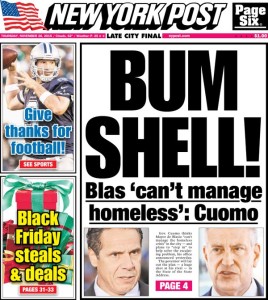By Jeremy Reynalds, Ph.D.
Founder and CEO
Joy Junction Inc.
 The New York Post, never considered a shining example of responsible journalism, is at it again.
The New York Post, never considered a shining example of responsible journalism, is at it again.
Perhaps most famous for its 1983 headline, “Headless Body in Topless Bar” Post writers have been verbally savaging the homeless. A recent story by Danielle Furfaro headlined “Homeless reign over LaGuardia to come to an end” reads in part, “The Port Authority said Friday it will turn La Guardia Airport into a bum-free zone — but not until after the holidays.”
The writer added that the homeless have also been occupying chairs intended for passengers “while snoring under blaring televisions.”
Would Furfaro describe other groups of people in that way?
This followed a similarly nasty story by Furfaro, Philip Messing and Georgett Roberts titled “Homeless Squatters are Taking Over La Guardia Airport.
Some of the narrative in that piece read, “Vice President Joe Biden once compared it to a ‘Third World country’ – but LaGuardia Airport has become so riddled with homeless that it could now even make some of those nations look good.”
Really? I emailed the writers to ask about their terminology. I added that I recently spent a number of months in the Philippines, which included some trips to areas of Manila inhabited by poverty stricken, hungry and homeless people. I seriously doubt whether there is any comparison.
The story also talked about “The number of derelicts living at the airport …”
The word derelict is one that is emotionally charged and traditionally perceived as being negative.
Webster’s defines the word as meaning, “No longer cared for or used by anyone; failing to do what should be done.”
The Urban Dictionary has a more colorful definition, dubbing someone who is derelict as “One whom is of the white trash community, poor, has no working job and unpleasant to be around.”
My journalism professors from a few years ago would have most likely given me a poor or failing grade if I used that word to describe the homeless.
Another portion of the article read, “In the mornings, some of the bums leave for the day.” 
Not surprisingly, none of the writers whom I emailed at the Post responded. I wondered whether their style of writing is part of a disdain they have for the homeless, or are they being encouraged by tabloid editorial policy to use words that are so emotionally charged they will sell more papers or produce more clicks.
There had to be more in the minds of these writers when they went to college than trashing the homeless. Didn’t they ever hope that their writing could at least play some small part in helping make our world a better place?
Words have power-and reporters need to realize that the homeless and other subjects of their stories-are real human beings with feelings.
The homeless are more than just words to be carelessly and capriciously splattered over the pages of tabloid fodder.
We asked a few of our guests at Joy Junction what they thought about the reporters’ verbiage.
One woman dubbed their writing “sad and ignorant.”
She continued, “There’s no reason to shame these people … The writers should be more educated … before they judge anyone.”
One man told us he has a problem with the homeless being labeled as bums and vagrants. He added, “I don’t think that people have the right to label human beings like that.”
Another woman wrote, “The reporters who are shaming these poor people probably have no idea what it’s like to go through trials. Instead of using negative press and media to hurt them and make their lives more difficult, they should use the power of words to help them.”
A man called the writers of the articles, “Small minded and heartless.” He added that they should be ashamed of the way they write.
This comment was thoughtful, and surprising, with one guy saying “I’m actually ok with what they said.”
He added, “Since I’ve been homeless, I’ve come to understand that a lot of people are ignorant about homelessness and don’t know the whole story of our lives. So, for them to say that is completely based on ignorance. I just wish that they would research homeless issues before they go insulting people that they don’t know.”
Amen to that!
Moving right along. A story by Post writer Carl Campanile headlined “The ‘shock’ psych ward Cuomo may convert to homeless shelter” continued the ugly tone.
Here’s one extract. “ … hordes of city homeless people could soon find themselves housed in a facility that was once reserved for shock-treating the mentally insane …”
How many other groups of people would you describe as a “horde?” While perhaps not as bad as bum or vagrant, it is right on the edge.
There was more. Here’s another extract. We’re back to the vagrant word. “ (The facility) … could easily be converted into suitable lodgings for some of the Big Apple’s skyrocketing vagrant population.”
Could Post Editor-in-Chief Col Allan be at least partly to blame? “If the story isn’t about homeless people pissing in front of Allan’s house, he doesn’t care,” a story by the New York Daily News reported one senior Post staffer said.
He added, “It’s disgusting and stupid, and it’s the only thing (Col Allan) cares about.”
I emailed Allan, but have yet to hear back. I’m not holding my breath.
I asked Fred Bales, one of my former journalism professors at the University of New Mexico, what he thought. By email he said, “ … I think it is best to let the Post wallow in its polluted juices without further comment.”
However, there’s a problem with the Post (and other media’s) sensational and ratings-driven stories about the homeless. It’s an issue addressed in my 2006 doctoral dissertation “Homeless Culture and the Media.”
If this negative coverage continues (and there are no signs that it won’t), then media consumers will end up with an even more negative perception of the homeless than they already have. That could result in a significant lack of compassion for the plight of the homeless.
Bales agreed that if offensive language is repeated, it will “likely seep its way into the realm of believability for some folks.”
That could have potentially have tragic life threatening consequences for the homeless (because of desensitization to the problem), and result in financial shortfalls for the organizations which help an ever increasing number of homeless and hungry people.
It’s time to let people know that this form of “journalism” is not acceptable. That’s for sure a story which needs to be told.


